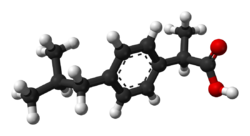Acetaminophen (a.k.a paracetamol) and Ibuprofen are the most widely used over-the-counter medications for relief from pain and fever. The primary difference between the two is that ibuprofen is a non-steroidal anti-inflammatory drug (NSAID) and can be used to reduce redness and swelling associated with inflammation, while acetaminophen does not affect injuries like a sprained ankle or other inflammation-based pain since it is not a NSAID .
Comparison chart
| | Acetaminophen | Ibuprofen |
|---|---|---|
 |  | |
| Legal status | Over the counter (OTC) in the U.S | Over the counter (OTC) in the U.S.; Unscheduled (AU); GSL (UK); |
| Routes | Oral, rectal, intravenous | Oral, rectal, topical, and intravenous |
| Used for | Pain relief, fever reduction. | Pain relief, fever reduction, improved blood flow |
| Bioavailability | almost 100% | 49–73% |
| Trade names | Acetaminophen is the generic name. Brand names for the drug include Tylenol, Feverall, Panadol, Anacin and Excedrin (with aspirin) | Ibuprofen is the generic name. Brand names for the drug include Advil, Motrin, IBU, Caldolor, EmuProfen |
| Half life | 1–4 hours | 1.8–2 hours |
| Adverse effects | Minimal, except for rare but potentially fatal skin reactions. | Severe stomach bleeding including ulcers, heartburn, gastrointestinal upset, constipation. |
| Formula | C8H9NO2 | C13H18O2 |
| Pregnancy category | Safe: A (AU); B (US) | C (AU); D (US) |
| Time to take effect | 11 to 29.5 minutes orally. | 24.5 minutes in liquigel format orally. |
| Toxicity | Overdosing (exceeding 4,000 milligrams a day for adults, or 2,000 for elderly persons) can cause permanent liver damage, a risk heightened by chronic alcohol abuse. | Long-term use can lead to kidney damage, heart attack, or stroke. |
| Advisories | An ingredient in more than 150 cough & cold, pain, sleep and allergy medications, listed as acetaminophen or APAP. | Avoid before or after surgery, or in case of allergies to asprin, naproxen (Aleve) or other non-steroidal anti-inflammatory drugs (NSAID). |
| Chemical names | N-acetyl-p-aminophenol | iso-butyl-propanoic-phenolic acid |
Pros and Cons
Acetaminophen is milder on the digestive tract and causes no stomach problems, so it can be safely taken without food. It is generally considered safe for use during pregnancy and for younger children, and effective for relief from mild to moderate levels of pain.
Ibuprofen generally provides stronger pain relief than acetaminophen, and its anti-inflammatory properties make it more effective at treating inflammation-based pain.
Side Effects
While considered safe if taken as directed, an overdose of acetaminophen over the recommended daily dose (4,000 mg per day for adults) can lead to potentially fatal liver damage. This danger is compounded by the fact that many over-the-counter and prescription products combine acetaminophen with other medications, which could lead someone to take more than the recommended daily dose without realizing it. Acetaminophen can be found in products including analgesics, antipyretics, cough/cold medicines and sleep aids. In addition, alcohol consumption further exacerbates the risk of liver damage. In rare cases, acetaminophen can cause potentially fatal skin reactions such as Stevens-Johnson syndrome and toxic epidermal necrolysis.
Ibuprofen, though also considered safe if taken as directed (recommended daily dose of 1,200 mg per day for adults), has side effects like constipation, heartburn, and can increase the risk of stomach ulcers and gastrointestinal bleeding. Because Ibuprofen is stronger and longer lasting than acetaminophen, it is even more important that the recommended dose within a 24-hour period not be exceeded. Regular use of NSAIDs like Ibuprofen has been linked with an increased risk of hearing loss, hypertension, and heart attack.
A newly discovered side effect of acetaminophen is that it blunts emotional response i.e., it reduces how much users actually feel emotions, including positive emotions in response to pleasing stimuli. Since this is new research, it has not been completed on other drugs such as ibuprofen and aspirin.
How The Drugs Work
This is how acetaminophen (aka paracetamol) and ibuprofen work in the body.
Counter Indications
Prolonged daily use of acetaminophen increases the risk of upper gastrointestinal complications like stomach bleeding, and may damage the liver or kidneys. As a result, a doctor should be consulted before taking acetaminophen for a prolonged period. Individuals with stomach, liver, or coagulation problems should consult a doctor before taking Ibuprofen, as the drug could adversely affect existing conditions. Those with asthma should also consult a physician, as Ibuprofen has been known to exacerbate it, sometimes fatally.
Common Brand Names
The most popular brand names Acetaminophen (aka Paracetamol) is sold under are Tylenol, Feverall, Panadol, Anacin and Excedrin (a combination of acetaminophen and aspirin).
Ibuprofen is most commonly known by the brand names Advil, Motrin, IBU, Cladolor, and EmuProfen.
Price
Ibuprofen and acetaminophen are both generics, patent-free and have been around for a long time. There are several manufacturers for each drug and given the competition, prices are not very high. Of course, when packaged using a brand name like Advil or Tylenol, there is usually a premium in the price.
Where to buy
- Ibuprofen on Amazon.com (starts at $0.01 per 200mg tablet)
- Acetaminophen on Amazon.com (starts at $0.01 per 500mg pill)




 Acetaminophen
Acetaminophen  Advil
Advil  Aspirin
Aspirin  Aleve
Aleve  Common Cold
Common Cold  Amoxicillin
Amoxicillin
Comments: Acetaminophen vs Ibuprofen